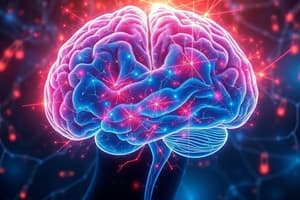Podcast
Questions and Answers
What is the main focus of the research presented by Professor Abdel Douiri?
What is the main focus of the research presented by Professor Abdel Douiri?
- To learn advanced statistical methods
- To examine the mathematical theories behind statistics
- To understand the role of statistics in real research (correct)
- To study the health services offered to stroke patients
Which of the following describes a publication by Douiri et al.?
Which of the following describes a publication by Douiri et al.?
- It evaluates the effectiveness of health services in stroke recovery.
- It reports on the long-term effects of secondary prevention on cognitive function in stroke patients. (correct)
- It discusses the immediate effects of stroke on cognition.
- It analyzes short-term cognitive rehabilitation methods.
What significant statistic regarding stroke is mentioned?
What significant statistic regarding stroke is mentioned?
- Every year, over 15 million people worldwide have a stroke. (correct)
- Stroke is a preventable condition with no long-term effects.
- Strokes are the leading cause of cognitive impairment in elderly patients.
- More than 20 million people experience strokes annually.
Who is NOT part of the research team presented?
Who is NOT part of the research team presented?
What aspect of stroke has been a research interest for Professor Douiri?
What aspect of stroke has been a research interest for Professor Douiri?
What is a key learning objective of the presentation?
What is a key learning objective of the presentation?
What research aspect does the South London Stroke Register emphasize?
What research aspect does the South London Stroke Register emphasize?
Which of the following best describes the conclusion of Douiri et al.'s research?
Which of the following best describes the conclusion of Douiri et al.'s research?
What is the main consequence of vascular cognitive impairment (VCI)?
What is the main consequence of vascular cognitive impairment (VCI)?
What percentage of patients with a first-ever stroke develop cognitive impairment according to recent findings?
What percentage of patients with a first-ever stroke develop cognitive impairment according to recent findings?
Which outcome measure was used to assess global cognitive function in the study?
Which outcome measure was used to assess global cognitive function in the study?
What gap in knowledge does the content highlight regarding post-stroke cognitive impairment?
What gap in knowledge does the content highlight regarding post-stroke cognitive impairment?
Which of the following statements about dementia and stroke is correct?
Which of the following statements about dementia and stroke is correct?
What approach is suggested to potentially protect global cognitive function after a stroke?
What approach is suggested to potentially protect global cognitive function after a stroke?
In the recent study, what percentage of patients had cognitive impairment after a recurrent stroke?
In the recent study, what percentage of patients had cognitive impairment after a recurrent stroke?
According to the discussed mechanisms, what causes damage to brain tissue leading to vascular cognitive impairment?
According to the discussed mechanisms, what causes damage to brain tissue leading to vascular cognitive impairment?
Which treatment combination has been shown to significantly protect against cognitive decline?
Which treatment combination has been shown to significantly protect against cognitive decline?
What is the effect of a combination of antihypertensives, antithrombotics, and lipid-lowering drugs on the risk of cognitive impairment?
What is the effect of a combination of antihypertensives, antithrombotics, and lipid-lowering drugs on the risk of cognitive impairment?
In which patient population was the protective effect of combined treatments not observed?
In which patient population was the protective effect of combined treatments not observed?
What is suggested for optimal protection from cognitive impairment in stroke patients?
What is suggested for optimal protection from cognitive impairment in stroke patients?
What association did the use of statins have on stroke patients?
What association did the use of statins have on stroke patients?
What role does primary care and mental health services play in the management of cognitive impairment post-stroke?
What role does primary care and mental health services play in the management of cognitive impairment post-stroke?
Which treatment has the highest relative risk for patients with hemorrhagic stroke according to the provided data?
Which treatment has the highest relative risk for patients with hemorrhagic stroke according to the provided data?
What is the adjusted relative risk of using lipid-lowering agents for ischaemic stroke without AF?
What is the adjusted relative risk of using lipid-lowering agents for ischaemic stroke without AF?
In the context of secondary prevention, which aspect is highlighted as a benefit of prescribed drugs?
In the context of secondary prevention, which aspect is highlighted as a benefit of prescribed drugs?
Which drug class shows the lowest relative risk for patients with ischaemic stroke with AF according to the data provided?
Which drug class shows the lowest relative risk for patients with ischaemic stroke with AF according to the data provided?
What is the general trend observed in the usage of antihypertensive mono-therapy for ischaemic stroke with AF?
What is the general trend observed in the usage of antihypertensive mono-therapy for ischaemic stroke with AF?
Which combination therapy for ischaemic stroke without AF has an adjusted relative risk close to 1.0?
Which combination therapy for ischaemic stroke without AF has an adjusted relative risk close to 1.0?
Within the South London Stroke Register population, which ethnic group comprises the highest percentage?
Within the South London Stroke Register population, which ethnic group comprises the highest percentage?
What are the approximate percentages of ethnic representation in Black individuals in the population studied?
What are the approximate percentages of ethnic representation in Black individuals in the population studied?
For ischaemic stroke without AF, which treatment option demonstrates the greatest reduction in relative risk?
For ischaemic stroke without AF, which treatment option demonstrates the greatest reduction in relative risk?
What is the relative risk of anticoagulant treatment for ischaemic stroke with AF?
What is the relative risk of anticoagulant treatment for ischaemic stroke with AF?
Flashcards are hidden until you start studying
Study Notes
Overview of Aims
- Aim to understand the practical use of statistics in collaborative research, particularly in real-world settings.
- Focus on the use of statistics rather than advanced statistical methods or examination.
Stroke Overview
- Stroke is a severe medical condition caused by interrupted blood supply to the brain.
- Annually, over 15 million people experience a stroke globally, resulting in:
- One-third die.
- One-third left with disabilities or cognitive impairment.
- One-third recover without serious effects.
Post-Stroke Cognitive Impairment
- Defined as vascular cognitive impairment (VCI), caused by brain tissue damage due to reduced oxygen supply.
- VCI correlates with increased disability and mortality rates.
- Prevalence rates include:
- 10% of patients had dementia prior to the first stroke.
- 10% develop dementia post-first stroke.
- Over one-third experience cognitive impairment following recurrent strokes.
Collaborative Research
- Research studies from the South London Stroke Register focused on cognitive impairment post-stroke:
- Significant finding: Approximately 25% of patients develop cognitive impairment after their first-ever stroke.
Statistical Methods Used
- Calculation of adjusted rates and 95% confidence intervals.
- Regression analyses to evaluate relative risk ratios and hazard ratios.
Knowledge Gaps
- Existing treatment strategies primarily reduce cardiovascular event risks, lacking approaches for preventing cognitive decline and dementia progression after a stroke.
Study Objectives and Design
- Objective: Analyze if vascular secondary prevention drugs safeguard cognitive function post-stroke.
- Design: Utilized the South London Stroke Register database (1995-2011) with 4,413 patients.
- Global cognitive function measured using the Abbreviated Mental Test or Mini-Mental State Exam.
- Statistical methods included generalized estimating equation Poisson models.
South London Stroke Register
- A population-based registry tracking first-ever strokes in North Lambeth and North Southwark since 1995.
- Source population demographics:
- 56% White,
- 25% Black (7% Caribbean, 14% African, 4% Other),
- 4% Mixed,
- 15% Other ethnic groups.
Results: Drug Efficacy by Stroke Type
- Antihypertensives showed varying protective effects against cognitive decline based on stroke type, particularly effective in ischaemic strokes without atrial fibrillation.
- Optimal therapy leads to a significant reduction in cognitive impairment risk.
Clinical Perspective
- Secondary prevention strategies decrease not just the chance of recurrent ischaemic events but also global cognitive decline.
- Treating with certain antihypertensive medications and combinations of antithrombotics substantially protects cognitive ability.
- Effectiveness appears limited in patients with hemorrhagic strokes or associated atrial fibrillation.
Conclusion
- Customized combinations of antithrombotic, antihypertensive, and lipid-lowering agents can potentially protect against cognitive impairment.
- Managing vascular risk factors is crucial for cognitive function preservation post-stroke.
- Statin use associated with lower risks of cognitive impairment and improved patient survival rates.
Future Research Directions
- STROKOG consortium aims to study cognitive disorders following strokes and transient ischaemic attacks (TIAs).
- Plans for better management and monitoring by linking primary care and mental health services, focusing on depression and social isolation.
- Incorporating big data for risk prediction in small vessel disease and enhancing cardiovascular management and stroke prevention strategies.
Studying That Suits You
Use AI to generate personalized quizzes and flashcards to suit your learning preferences.




